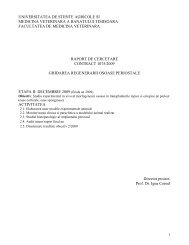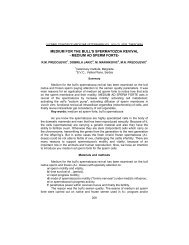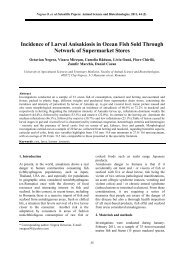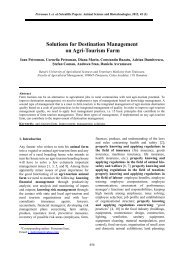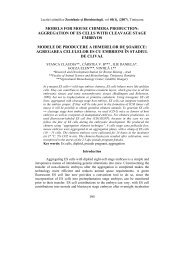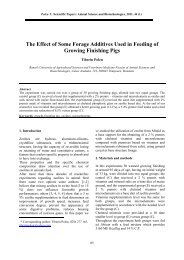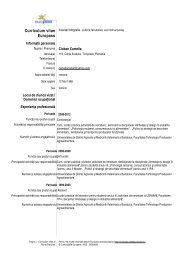journal of linguistic studies
journal of linguistic studies
journal of linguistic studies
Create successful ePaper yourself
Turn your PDF publications into a flip-book with our unique Google optimized e-Paper software.
THE FUNCTION OF EUPHEMISMS IN THE LANGUAGE<br />
OF NEWSPAPERS AND POLITICAL SPEECHES<br />
ŽELJKO RIŠNER<br />
Josip Juraj Strossmayer University, Osijek, Croatia<br />
zeljko.risner@os.t-com.hr<br />
ABSTRACT<br />
The aim <strong>of</strong> this paper is to describe the use <strong>of</strong> euphemisms in daily newspapers as<br />
a means <strong>of</strong> public communication, and to analyze and compare transcripts <strong>of</strong> some<br />
Croatian and foreign politicians’ speeches. Euphemisms shall be extracted and<br />
described with respect to some <strong>of</strong> their functions: the first and primary function <strong>of</strong><br />
s<strong>of</strong>tening facts and presenting them in a manner more acceptable for the masses, but<br />
also the secondary, derived function <strong>of</strong> (mis)using euphemisms for political purposes.<br />
Such derived euphemisms are intended to allow the speaker to alter the interpretation<br />
<strong>of</strong> his statements, depending on contextual needs. Such procedure frequently neglects<br />
the principles <strong>of</strong> political consistence and correctness and puts in question the<br />
credibility <strong>of</strong> the author <strong>of</strong> the statement.<br />
Keywords: Euphemisms; Euphemization; Taboo words; Political speeches<br />
1. INTRODUCTION<br />
Every language communication is subject to a number <strong>of</strong> rules <strong>of</strong> which we are<br />
frequently unaware and apply them “out <strong>of</strong> habit”. From the earliest age, for example, we<br />
are taught that we must be polite, that we must expresses ourselves nicely, taking care <strong>of</strong><br />
whom we are talking to and what we are talking about, and that we must choose our<br />
words very carefully. The fact is that with the acquisition <strong>of</strong> language we also acquire a<br />
system <strong>of</strong> written and unwritten rules about its pragmatism, i.e. about its usage in<br />
different situations and in different surroundings. The instruction that we must express<br />
ourselves nicely, however, <strong>of</strong>ten does not suggest which words and expressions should<br />
be used - on the contrary, it rather warns us that there are words and phrases that should<br />
not be used, that need to be avoided, and that are rude, prohibited, taboo. And here we get<br />
to the root <strong>of</strong> problem: the words in question are closely connected with basic life and<br />
body functions, with the very beginning <strong>of</strong> life and its end, with different illnesses and<br />
addictions, with a wide spectrum <strong>of</strong> human activities, as well as with the politics, with<br />
relations between nations and states… In short, they are omnipresent. Since simple<br />
deletion <strong>of</strong> the taboo-words from texts is impossible because it would make the<br />
communication impossible, it is necessary to replace them with acceptable, “good”<br />
words/expressions following the principle <strong>of</strong> closeness or similarity <strong>of</strong> meaning. Such<br />
acceptable, good words or expressions are called euphemisms 1 .<br />
Euphemisms are, therefore, part our everyday life. We use them in the<br />
communication with colleagues at work, in discussing our favourite topics while having<br />
c<strong>of</strong>fee with our friends, in a variety <strong>of</strong> situations in family surroundings, while we are<br />
talking with our children, spouse, relatives… In most cases we are not aware that we are<br />
using euphemisms, partly because <strong>of</strong> their conventionality, and partly because<br />
euphemisms are rather difficult to be recognized as such since, according to their<br />
57



